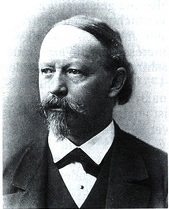Friedrich Goll
Friedrich Goll (1829–1903) was a Swiss physiologist known for his contributions to the understanding of the nervous system, particularly in the area of neuroanatomy. His work laid foundational knowledge for the study of neural pathways and the structure of the spinal cord, significantly influencing the field of neuroscience.
Early Life and Education[edit | edit source]
Friedrich Goll was born in Switzerland in 1829. From a young age, he showed a keen interest in the sciences, which led him to pursue a career in medicine. He received his medical degree from a prestigious Swiss university, where he was influenced by prominent figures in the field of medicine and physiology.
Career and Contributions[edit | edit source]
After completing his education, Goll dedicated himself to research in physiology, with a particular focus on the nervous system. His most notable contribution was the discovery of the Goll's tract (also known as the fasciculus gracilis), a bundle of nerve fibers in the dorsal column of the spinal cord that is responsible for carrying fine touch and proprioceptive information from the lower half of the body to the brain.
Goll's research on the spinal cord and its pathways was groundbreaking. He meticulously documented the anatomy and functions of various nerve tracts, contributing to a deeper understanding of how the nervous system processes sensory information and controls movement. His work helped to map the complex network of neural connections, paving the way for future discoveries in neuroanatomy and neurophysiology.
Legacy[edit | edit source]
Friedrich Goll's contributions to neuroscience are still recognized today. His discovery of the Goll's tract remains a fundamental part of neuroanatomy, taught to medical and neuroscience students worldwide. Goll's dedication to understanding the intricacies of the nervous system has inspired generations of scientists to explore the mysteries of the brain and spinal cord.
Despite the advancements in neuroscience since Goll's time, his work continues to serve as a critical reference point for researchers studying the structure and function of the nervous system. His legacy is a testament to the enduring importance of foundational research in the ongoing quest to understand the complexities of human biology.
Death[edit | edit source]
Friedrich Goll passed away in 1903, leaving behind a legacy of scientific inquiry and discovery. His contributions to the field of physiology and neuroscience have made him a respected figure in the history of science.
Search WikiMD
Ad.Tired of being Overweight? Try W8MD's physician weight loss program.
Semaglutide (Ozempic / Wegovy and Tirzepatide (Mounjaro / Zepbound) available.
Advertise on WikiMD
|
WikiMD's Wellness Encyclopedia |
| Let Food Be Thy Medicine Medicine Thy Food - Hippocrates |
Translate this page: - East Asian
中文,
日本,
한국어,
South Asian
हिन्दी,
தமிழ்,
తెలుగు,
Urdu,
ಕನ್ನಡ,
Southeast Asian
Indonesian,
Vietnamese,
Thai,
မြန်မာဘာသာ,
বাংলা
European
español,
Deutsch,
français,
Greek,
português do Brasil,
polski,
română,
русский,
Nederlands,
norsk,
svenska,
suomi,
Italian
Middle Eastern & African
عربى,
Turkish,
Persian,
Hebrew,
Afrikaans,
isiZulu,
Kiswahili,
Other
Bulgarian,
Hungarian,
Czech,
Swedish,
മലയാളം,
मराठी,
ਪੰਜਾਬੀ,
ગુજરાતી,
Portuguese,
Ukrainian
Medical Disclaimer: WikiMD is not a substitute for professional medical advice. The information on WikiMD is provided as an information resource only, may be incorrect, outdated or misleading, and is not to be used or relied on for any diagnostic or treatment purposes. Please consult your health care provider before making any healthcare decisions or for guidance about a specific medical condition. WikiMD expressly disclaims responsibility, and shall have no liability, for any damages, loss, injury, or liability whatsoever suffered as a result of your reliance on the information contained in this site. By visiting this site you agree to the foregoing terms and conditions, which may from time to time be changed or supplemented by WikiMD. If you do not agree to the foregoing terms and conditions, you should not enter or use this site. See full disclaimer.
Credits:Most images are courtesy of Wikimedia commons, and templates Wikipedia, licensed under CC BY SA or similar.
Contributors: Prab R. Tumpati, MD

